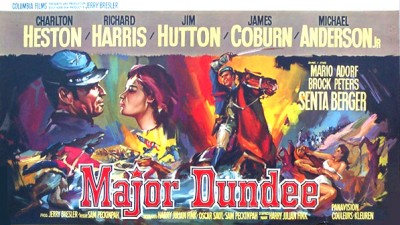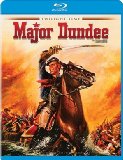| Reviews & Columns |
|
Reviews DVD TV on DVD Blu-ray 4K UHD International DVDs In Theaters Reviews by Studio Video Games Features Collector Series DVDs Easter Egg Database Interviews DVD Talk Radio Feature Articles Columns Anime Talk DVD Savant Horror DVDs The M.O.D. Squad Art House HD Talk Silent DVD
|
DVD Talk Forum |
|
|
| Resources |
|
DVD Price Search Customer Service #'s RCE Info Links |
|
Columns
|
|
|
Major Dundee
Over the years the myth of a "Peckinpah version" of Major Dundee has stubbornly persisted. The fact is his version is irretrievable, partly because even back then Peckinpah was a firebrand and a mean, self-destructive alcoholic (the career-ruining cocaine came later), and that the lost opportunity that was Major Dundee was as much self-inflicted. Peckinpah, for instance, never completely finished writing it (resulting in an outstanding first act and a weak third one) and he squandered Heston's extremely generous offer to forgo his salary in order to keep Peckinpah on the picture. Columbia Pictures kept Heston's money, but ultimately removed Peckinpah during the editing phase. Peckinpah envisioned a roadshow-styled cut running approximately two hours and 40 minutes though apparently this version was never finalized. Instead producer Jerry Bresler (Gidget) readied Major Dundee for release, and it was he, not Peckinpah, who prepared the original 136-minute cut. That version was released outside the United States and Britain but, following a disastrous preview in the U.S., Major Dundee was further cut to 122 minutes, which was the only version of the film most Americans saw until 2005.
At that point Sony Pictures, inheritors of the Columbia library, released Major Dundee - The Extended Version, making available the longer 136-minute version but, for this release, they also replaced the original, frequently inapt musical score by Daniele Amfitheatrof with a brand-new soundtrack by silent film scorer Christopher Caliendo. The intention was to replicate the style and orchestrations of '60s Hollywood movie music with something closer to what Peckinpah himself might have preferred. However, Caliendo's music, while an improvement in some ways, was equally inappropriate for various reasons and rightly criticized for its revisionist tampering. The consensus was that it was an interesting but ultimately misguided experiment.
Twilight Time's 2-disc Blu-ray release offers both problematic cuts of the film, the 122-minute version with the original Amfitheatrof score and the 134-minute "Extended Version" with the new music by Caliendo. As Major Dundee authority DVD Savant points out in his most recent of several reviews of the film, the viewer is needlessly denied the option of watching the original international version (i.e., the 134-minute cut) with the original scoring. Instead, one is limited to either the short version, so far removed from Peckinpah's vision that few will want to see it, or the better, longer version that wrongheadedly replaces a problematic score with another problematic score. Sony's earlier DVD release of Major Dundee offered 134-minute cut with multiple audio options, including with Amfitheatrof's original score, so there's really no apparent reason why Twilight Time couldn't have included it also.
The film in its current form is notably abstruse, partly because the film went into production without a crystalized, final draft screenplay. There's a murky backstory concerning Union cavalry officer Maj. Amos Dundee (Heston), especially in his relationship with a former West Point friend, Confederate Capt. Tyreen (Richard Harris), particulars of which trickle in slowly throughout the story or are subtly implied throughout. Further, the unauthorized campaign Dundee launches involves Union soldiers and Confederate prisoners, civilian mercenaries, and Indian scouts. They, at various times, find themselves battling Apache Indians, and Mexican soldiers and French troops fighting on behalf of Emperor Maximilian who themselves are fighting Juarista revolutionaries.
The massacre at Rostes Ranch, the loss of valuable troops, and kidnapping of three boys by Apache chief Charriba (Michael Pate) serves as an excuse for disgraced cavalry officer Dundee, reappointed to an insignificant prisoner-of-war camp in New Mexico Territory, to mount an illegal campaign across the border into Mexico. To accomplish this he'll need men, lots of men. Confederate prisoners led by Capt. Tyreen join up to avoid the hangman's noose and to possibly escape while in Mexico, as well as various drunks, cutthroats, and other unsavory types.
The movie is difficult to describe, partly because it's clearly horribly compromised. It's hard to determine exactly to what degree except to say that some scenes obviously looked rushed and incomplete, to the point where what should be expository scenes almost become schematic montages with narration trying to stich it all together. Characters, even armies, are introduced only to disappear during the second-half, and even the longer version leaves many obvious questions unanswered.
At the center is the Captain Ahab-, Ethan Edwards-like Dundee, a man obsessed with tracking down Charriba no matter how long it takes, no matter the price in human lives, and certainly no matter that he's exceeding his authority as a glorified jailer and all but inciting a private war. Unlike Ahab and Edwards but rather like Custer, Dundee is primarily interested in restoring his reputation, though he may be unaware of this. The movie contrasts Dundee with the defeated but chivalrous Tyreen, a man of honor whose word is his bond. In some respects the relationship between Dundee and Tyreen is the very opposite of what 1965 audiences were probably expecting. It's not clear if even Heston was fully aware that he was playing the villain of the piece. He certainly plays it like a man supremely confident that the ends justify his means. Is it a great, knowing performance or was Peckinpah pulling a fast one, withholding his intentions from his leading man just as William Wyler and Gore Vidal did when Heston made Ben-Hur (1959)?
What made it into the final film confirms it at an unrealized masterpiece, with challenging and original concepts crystalized better in The Wild Bunch or which are present only in Major Dundee. Other scenes, like the execution of deserter O.W. Hadley (Warren Oates), are supremely well-acted but also shamelessly cribbed from better movies, Lawrence of Arabia particularly. Some sequences are merely chaotic or simply bad, like Dundee's moral binge after being disgraced, wounded and smuggled into Durango, another Lawrence steal during which Heston's machismo performance is over-the-top laughable.
Yet other moments merely perplex. While Dundee is clearly more interested in glory than tracking down Charriba (or perhaps, as reader Sergei Hasenecz suggests, "that for Dundee, like Ahab and Ethan Edwards, there is now only the quest"), the final resolution of this premise is so absurdly anticlimactic one wonders if it was planned that way or merely the end result of an out-of-control production.
Though it includes some unnecessary material as well, the longer cut restores vitally important introductory scenes, more or less making the first and best third of the film whole. Much material remains missing, including graphic violence Bresler found offensive and/or likely to deny the film a Production Code seal of approval. Yet while still a long way away from The Wild Bunch, even in its butchered form Major Dundee is still bloodier than any pre-1966 American Western.
Christopher Caliendo's new music has many effective moments, but despite a lot of obvious effort rarely sounds like other mid-1960s Western film scores, as intended. Indeed, some scenes are scored very much in the Carl Davis, silent-scoring tradition, fighting for attention with what's onscreen. To me anyway, silent film accompaniment functions differently than talking picture film music. It's like a parallel performance running in tandem with the film, one complimenting the other. But in sound films generally the best movie music contributes without the viewer being aware of it, without the music drawing attention to itself, which this score all too often does.
Video & Audio
Filmed in Panavision with original printing by Pathï
|
| Popular Reviews |
| Sponsored Links |
|
|
| Sponsored Links |
|
|
| Release List | Reviews | Shop | Newsletter | Forum | DVD Giveaways | Blu-Ray | Advertise |
|
Copyright 2024 DVDTalk.com All Rights Reserved. Legal Info, Privacy Policy, Terms of Use,
Manage Preferences,
Your Privacy Choices | |||||||













